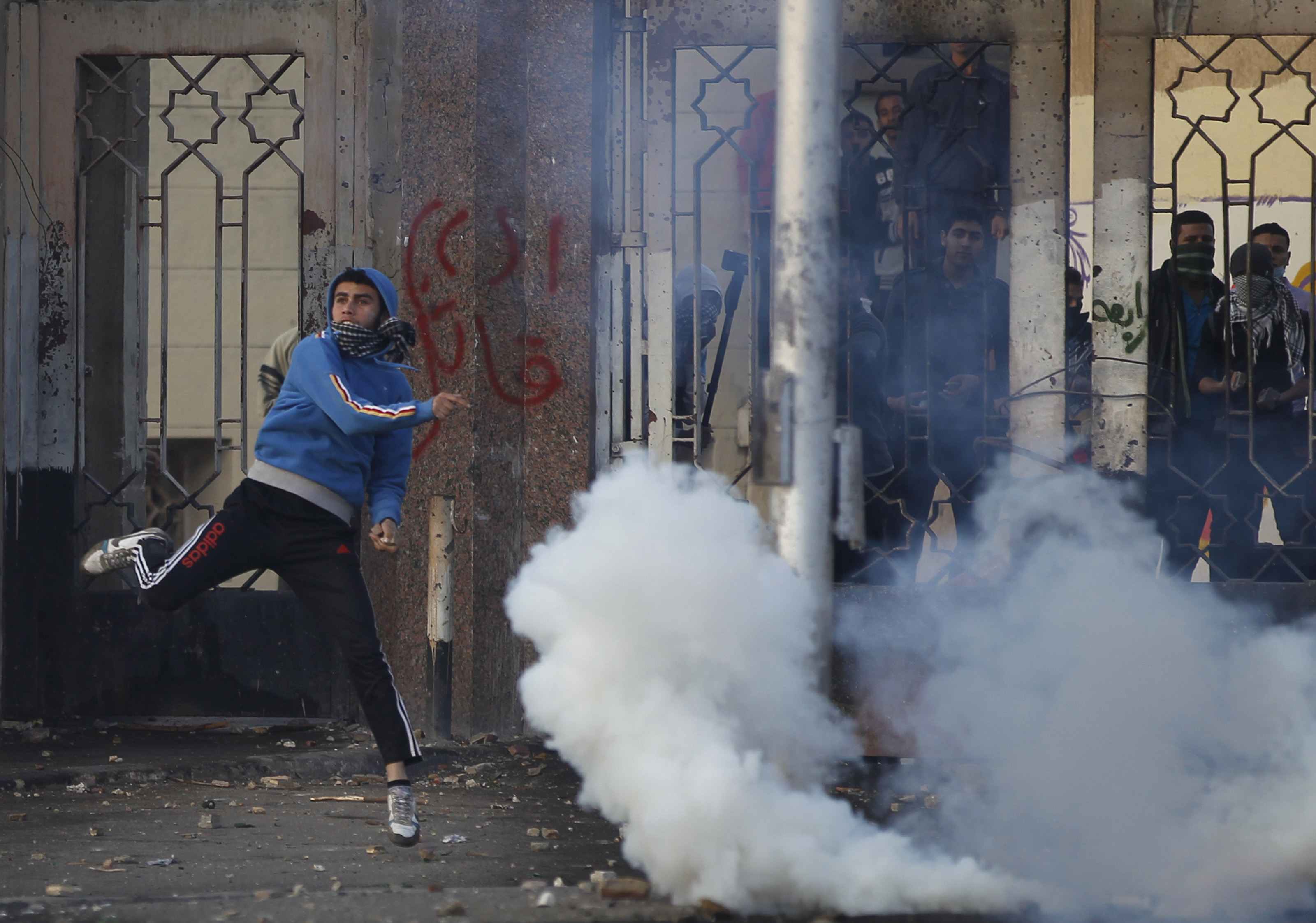Latest NEWS
- Aswat Masriya, the last word
- Roundup of Egypt's press headlines on March 15, 2017
- Roundup of Egypt's press headlines on March 14, 2017
- Former Egyptian President Hosni Mubarak to be released: lawyer
- Roundup of Egypt's press headlines on March 13, 2017
- Egypt's capital set to grow by half a million in 2017
- Egypt's wheat reserves to double with start of harvest -supply min
- Roundup of Egypt's press headlines on March 12, 2017
Islamist students clash with police at Cairo's Al-Azhar University

A student of Al-Azhar University, who is a supporter of the Muslim Brotherhood and deposed President Mohamed Mursi, throws a stone during clashes with riot police and residents of the area at the Al-Azhar University campus in the Nasr City district December 27, 2013. REUTERS/Amr Abdallah Dalsh
By Maggie Fick
CAIRO, Dec 28 (Reuters) - Egyptian students loyal to the Muslim Brotherhood fought police at the Cairo campus of Al-Azhar University on Saturday and set fire to two buildings, state television reported.
A student activist said a supporter of the Brotherhood, designated this week as a terrorist organisation by the state, had been killed, although a security source denied this.
State-run newspaper Al-Ahram said the clashes began when security forces fired teargas to disperse pro-Brotherhood students who were preventing their classmates from entering university buildings to take exams. Protesters threw rocks at police and set tyres on fire to counter the teargas.
State TV broadcast footage of black smoke billowing from the faculty of commerce building and said "terrorist students" had set the agriculture faculty building on fire as well.
Al-Azhar, a respected centre of Sunni Islamic learning, has for months been the scene of protests against what the Brotherhood calls a "military coup" that deposed Islamist Mohamed Mursi as president after a year in office.
Shaimaa Mounir, a member of the pro-Brotherhood "Students Against the Coup" movement, said that Khaled El-Haddad died of a wound, though it was not clear whether he had been hit by birdshot or another kind of ammunition.
It was not immediately possible to confirm the student's account, and a security source denied there had been any deaths.
The violence followed a day of clashes across the country that left five people dead.
Supporters of the Brotherhood took to the streets on Friday after the government designated the Islamist group a terrorist organisation - a move that increases the penalties for dissent against the government installed after the army ousted Mursi in July following mass protests against his rule.
The widening crackdown against the movement that was elected into power after the toppling of veteran leader Hosni Mubarak in 2011 has increased tension in a country suffering the worst internal strife of its modern history following Mursi's ousting.
CONSTITUTION VOTE
The army-backed government appears bent on clamping down on dissent ahead of a referendum next month on a new constitution, a step that will pave the way for parliamentary and presidential elections.
Thousands of Brotherhood members have been arrested. More than 250 Brotherhood supporters were arrested on Friday alone using the new classification.
Human Rights Watch said on Saturday that the government's designation of the Brotherhood as a terrorist group was "politically driven" and intended to end all of the movement's activities.
"By rushing to point the finger at the Brotherhood without investigations or evidence, the government seems motivated solely by its desire to crush a major opposition movement." said Sarah Leah Whitson of the New York-based rights group.
A conservative estimate puts the overall death toll since Mursi's fall at well over 1,500. Most of those killed were Mursi supporters, including hundreds gunned down when the security forces cleared a protest vigil outside a Cairo mosque.
At least 350 members of the security forces have also been killed in bombings and shootings since Mursi's downfall. The state has declared them martyrs of a war on terrorism.
An adviser to interim president Adli Mansour said in comments published on Saturday that he believed Egypt would not return to a state of emergency even if the violence continued.
Authorities lifted the state of emergency in November, three months after the army enforced the measures amid the bloody turmoil that followed its overthrow of Mursi.
Mustafa Hijazi told London-based Asharq al-Awsat newspaper that the designation of the Brotherhood as a terrorist group was not political. "Instead, it is the use and application of existing laws," he was quoted as saying.
Under the anti-terrorism law dating back to the presidency of Mubarak, those convicted can be jailed for life. Authorities said this week that the movement's leaders could face the death sentence. (Editing by Alison Williams)










